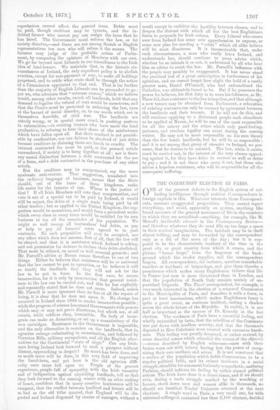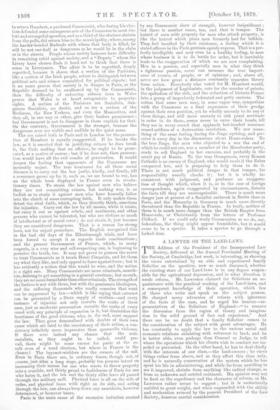THE COMMUNIST ELECTION IN PARIS.
ONE of the greatest defects in the English system of col- lecting intelligence through resident Correspondents in foreign capitals is this. Whatever interests those Correspond- ents, assumes exaggerated proportions. They cannot report everything, and avoid, apparently on system, anything like broad accounts of the general movement of life in the countries to which they are accredited—anything, for example, like M. Monad's invaluable rdsume's in the Contemporary Review— and therefore whatever they do send fills up too large a space in their readers' imaginations. The incident may be in itself almost trifling, and may be forwarded by the correspondent only as a bit of the news of the day ; but it is sup- posed to be the characteristic incident of the time in the great city or great country from which it comes, and the picture "looms large," from the hugeness of the back- ground which the reader supplies, and the correspondent forgets. All correspondents, for instance, mention remarkable murders or incidents of brigandage, and give them thereby a prominence which makes many Englishmen believe that life in France just now is more threatened than in London, and that the population of South Italy consists mainly of un- punished brigands. The Times' correspondent, for example, is very much interested in the election of a returned Communist to the Municipality of Paris, and describes it with a force, in part at least unconscious, which makes Englishmen fancy it quite a great event, an ominous incident, casting a shadow across the whole future of the Republic. In reality, it is not .half as important as the success of Dr. Kenealy at the last election. The workmen of Paris have a resentful feeling, not wholly unjustified by facts, that the rebellion of the Commune was put down with needless severity, and that the thousands deported to Nev Caledonia were treated with excessive harsh- ness. This feeling was greatly deepened, or rather revived, by some dreadful scenes which attended the return of the diporte's —scenes described by .English witnesses—men with their brains worn out with misery having lost the power of recog- nising their own mothers and wives. It is not unnatural that a section of the population which holds Communism to be a regular political faith, and its crimes incidents in a social struggle, should be for a moment furiously sympathetic, and being Parisian, should indicate its feeling by rather absurd political actions The Irish have done it a dozen times, and if we should ever, during a trade struggle marked by the wrecking of houses, shoot down men and women alike in thousand, we should see fanatical 'Trades' Unionists returned at the next elections. A single ward in Paris, a very small one, for with universal suffrage it contained less than 2,100 electors, decided
to return Humbert, a pardoned Communist, who during his elec- tion defended some outrageous acts of the Commune in most vio- lent and revengeful speeches, and as a third of the electors abstain from the polls, did return him to the municipality, where, among the harder-headed Radicals with whom that body is filled, he will be not one-half as dangerous as he would be in the clubs or in the streets. People whom society honours have difficulty in remaining rabid against society, and a " Deputy " whom the Livery have chosen finds it hard not to think that there is sense in Liverymen. The affair is to be regretted, deeply regretted, because it shows that a section of the Parisians, like a section of the Irish people, refuse to distinguish between political acts and crimes committed for political objects ; but it no more proves that society is in danger in Paris, or the Republic doomed to be swallowed up by the Communists, than the difficulty of enforcing salmon laws in Wales proves that Wales is at heart antagonistic to property-
rights. A section of the Parisians are Socialists, dan- gerous Socialists, no doubt, and so are a section of the Berliners, the New Yorkers, and even the Muscovites, and they all, in one way or other, give their leaders prominence ; but Government is not to disappear in those capitals for that. On the contrary, Government is the stronger, because the dangerous men are visible and audible to the quiet mass, The cry raised both in Paris and in London for the prosecu- tion of Humbert is equally exaggerated. If he breaks the law, as it is asserted that in justifying crimes he does break it, the Code making that an offence, he ought to be prose- cuted, as a matter of course ; but if he does not, then prosecu- tion would have all the evil results of persecution. It would ,deepen the feeling that opponents of the Commune are incurably unjust. The true treatment for all these social diseases is to carry out the law justly, kindly, and firmly, till a reverence grows up for it, such as, we are bound to say, has on the whole been displayed in France even in revolu- tionary times. To strain the law against men who believe they are not committing crimes, but making war, is as foolish as to strain it against men who have honestly fallen into the clutch of some corrupting faith. It only makes them detest the rival faith, which, as they directly think, sanctions the injustice. Carry out the law by all means, while it exists, but carry it out as against rebels, and mutineers, and other persons who cannot be tolerated, but who are victims as much of intellectual as of moral error ; do not strain it, just because they are considered dangerous. That is a reason for strong laws, not for unjust procedure. The English recognised this in the bad old days of the Ellenborough trials, and have been forced to accept it as regards trade combinations ; and the present Government of France, which, in many respects, is a very wise and self-respecting one, is beginning to perceive the truth, too. It may not prove to possess the nerve to treat Communists as it treats Henri Cinquists, and let them say what they like, and only appeal to force against force ; but it has evidently a notion that this would be wise, and the notion is a right one. Many Communists are mere criminals, anarch- ists, desiring to get something in a general overturn; but as such, they are no more formidable than other criminals. The strength of the faction is not with them, but with the passionate idealogues, and the suffering thousands who madly conceive that want can be suppressed by law—which is like saying that cataract can be prevented by a State supply of oculists—and every instance of injustice not only recruits the ranks of these men, just as moderate persecution recruits the ranks of every creed with any principle of expansion in it, but diminishes the heartiness of the good citizens, who, in the end, must support the law. They grow demoralised with doubts of their own cause which are fatal to the consistency of their action, a con- sistency infinitely more impressive than spasmodic violence. If there were indeed any chance that the anti- socialists, as they ought to be called, could pre- vail, there might be some excuse for panic at the re- sult even of a ward election, but where in France is the .chance I The bayonet-wielders are the owners of the soil.
Even in Paris there are, in ordinary times, though not, of course, just after a long siege, probably ten persons intent on increasing their means for one who wants to throw property into a crucible, and thirty proud to foolishness of Paris for one who hates it, and the ten and the thirty alike have all passed through the military mill. Physical force is all on the side of order, and physical force with right on its side, and acting through the law, can always keep down any anarchists, however determined, or however brave.
Panic is the main cause of the excessive irritation created by any Communist show of strength, however insignificant ; but there is another cause, too, and that is temper. The hatred of men with property for men who attack property, is like the hatred which pious men formerly had for infidels. They feel insulted by their existence, a feeling which it is stated officers in the Paris garrison openly express. That is a per- fectly intelligible and may even be a healthy feeling, in men whose business it is to do battle for order, but it inevitably leads to the exaggeration of which we are now complaining. Men in a passion, and especially men in what they think a righteous passion, never can measure the true import- ance of events, of people, or of opinions ; and, above all, never see how great a distance constantly separates theory from action. Everybody who voted for M. Humbert would, in the judgment of Legitimists, vote for the murder of priests, the spoliation of the rich, and the reduction of historic France into a group of imperfectly federated and petty cantons. The notion that some men may, in some vague way, sympathise with the Commune as a final expression of their grudge against their own position, yet be wholly unready to do any of these things, and still more unready to risk penal servitude in order to do them, seems never to enter their heads, till they see in every crowd that applauds hot-headed nonsense armed soldiers of a destructive revolution. We saw some- thing of the same feeling during the Jingo uprising, and per- ceive it every day in the discussions about Home-ruleni. To the true Jingo, the man who objected to a war the end of which he could not see, was a member of the Manchester party, ready to sell England to her enemies, and probably in the secret pay of Russia. To the true Orangeman, every Roman Catholic is an enemy of England, who would exult if the Zulus conquered her, and is preparing to help them to do it. There is not much political danger in that temper, for responsibility usually checks it ; but it is wholly in- consistent with judgment, and produces an exaggera- tion of thought which, when it is, as in the case of foreign correspondents, again exaggerated by circumstances, distorts the facts till they are unrecognisable. There is much more danger just at present of a Socialist outbreak in Berlin than in Paris, and the Monarchy in Germany is much more directly threatened than the Republic in France. In truth, neither of them is in much more danger than the British Empire from Home-rule, or Christianity from the letters of Professor Clifford. If we could only study Communism as we do, say, federalism, the thing might appear formidable, but it would cease to be a spectre. It takes a spectre to go through a locked door.



































 Previous page
Previous page